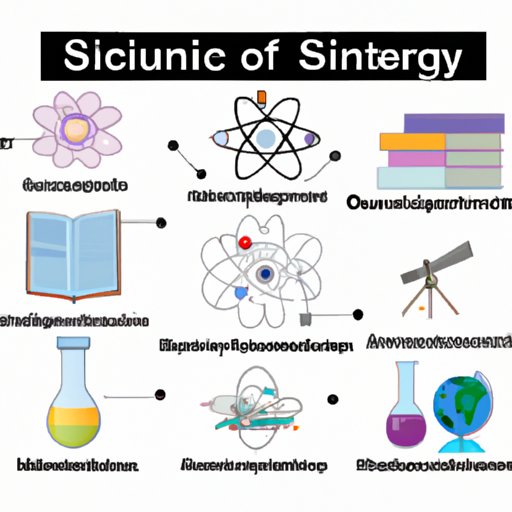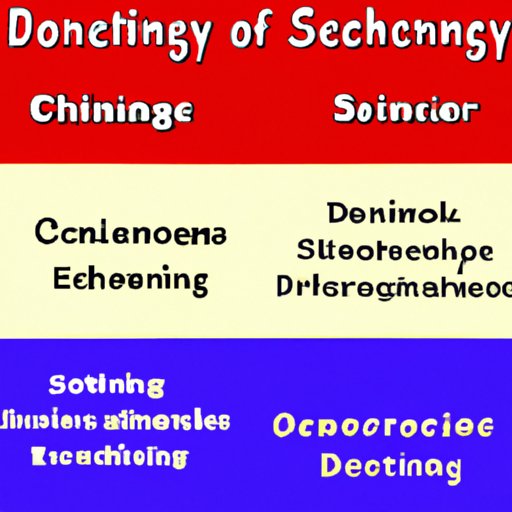An Overview of the Fields of Science
Science is an expansive field that encompasses a wide range of disciplines. From the physical sciences to the social sciences, and from the applied sciences to the life sciences, the world of science is vast and diverse. In this article, we will explore the different fields of science in depth, providing an overview of each field and a comprehensive guide to the various sub-fields.
A Definition of Science
According to the Oxford English Dictionary, science is “the intellectual and practical activity encompassing the systematic study of the structure and behaviour of the physical and natural world through observation and experiment”. In other words, science is the pursuit of knowledge and understanding of the natural world through the use of scientific methods such as observation, experimentation, and analysis.
Different Types of Sciences
The fields of science can generally be divided into four main categories: physical sciences, life sciences, social sciences, and applied sciences. The physical sciences are concerned with the study of matter and energy and include disciplines such as astronomy, physics, and chemistry. The life sciences focus on the study of living organisms and include disciplines such as biology, zoology, and biochemistry. The social sciences are concerned with the study of human behaviour and society and include disciplines such as psychology, sociology, and anthropology. Finally, the applied sciences are concerned with the application of scientific knowledge to practical problems and include disciplines such as engineering, medicine, and computer science.

A Comprehensive Guide to the Different Areas of Science
Physical Sciences
The physical sciences are concerned with the study of matter and energy and include disciplines such as astronomy, physics, and chemistry. Astronomy is the study of the universe and its components, including stars, planets, galaxies, and other celestial bodies. Physics is the study of the laws of nature and the properties of matter and energy. Chemistry is the study of the composition, structure, and properties of matter and the changes it undergoes.
Life Sciences
The life sciences are concerned with the study of living organisms and include disciplines such as biology, zoology, and biochemistry. Biology is the study of living organisms and their interactions with their environment. Zoology is the study of animals and their behavior, anatomy, physiology, and ecology. Biochemistry is the study of the chemical processes that occur within living organisms.
Social Sciences
The social sciences are concerned with the study of human behaviour and society and include disciplines such as psychology, sociology, and anthropology. Psychology is the study of the mind and behaviour. Sociology is the study of social relationships, institutions, and societies. Anthropology is the study of human cultures, societies, and their development.
Applied Sciences
The applied sciences are concerned with the application of scientific knowledge to practical problems and include disciplines such as engineering, medicine, and computer science. Engineering is the design and implementation of systems to solve practical problems. Medicine is the practice of diagnosing and treating illnesses and diseases. Computer science is the study of algorithms and data structures and their applications in software development.

Exploring the Branches of Science
Astronomy
Astronomy is the study of the universe and its components, including stars, planets, galaxies, and other celestial bodies. Astronomers observe and analyze the light emitted by these objects in order to better understand the structure, evolution, and composition of the universe.
Biology
Biology is the study of living organisms and their interactions with their environment. This includes the study of their structure, function, growth, origin, evolution, and distribution.
Chemistry
Chemistry is the study of the composition, structure, and properties of matter and the changes it undergoes. This includes the study of elements and compounds, and their reactions with each other.
Physics
Physics is the study of the laws of nature and the properties of matter and energy. This includes the study of motion, forces, energy, and matter.
Earth Sciences
Earth sciences are the study of the Earth and its components, including its atmosphere, oceans, and geology. This includes the study of weather and climate, plate tectonics, and oceanography.
Computer Science
Computer science is the study of algorithms and data structures and their applications in software development. This includes the study of programming languages, operating systems, databases, and networks.
Mathematics
Mathematics is the study of numbers, shapes, and patterns. This includes the study of algebra, geometry, calculus, and statistics.
Medicine
Medicine is the practice of diagnosing and treating illnesses and diseases. This includes the study of anatomy, physiology, pharmacology, and pathology.
Psychology
Psychology is the study of the mind and behaviour. This includes the study of cognition, emotion, learning, memory, and perception.
Sociology
Sociology is the study of social relationships, institutions, and societies. This includes the study of social interaction, social change, and social organization.

The Different Types of Science and What They Entail
Natural Science
Natural science is the study of the physical and biological world. This includes the study of astronomy, biology, chemistry, physics, and earth sciences.
Formal Science
Formal science is the study of mathematics and logic. This includes the study of algebra, geometry, calculus, and statistics.
Social Science
Social science is the study of human behaviour and society. This includes the study of psychology, sociology, anthropology, economics, and political science.
Applied Science
Applied science is the application of scientific knowledge to practical problems. This includes the study of engineering, medicine, computer science, and agriculture.
Unveiling the World of Science and its Sub-fields
Astronomy
Astronomy is the study of the universe and its components, including stars, planets, galaxies, and other celestial bodies. Astronomers observe and analyze the light emitted by these objects in order to better understand the structure, evolution, and composition of the universe.
Biology
Biology is the study of living organisms and their interactions with their environment. This includes the study of their structure, function, growth, origin, evolution, and distribution.
Chemistry
Chemistry is the study of the composition, structure, and properties of matter and the changes it undergoes. This includes the study of elements and compounds, and their reactions with each other.
Physics
Physics is the study of the laws of nature and the properties of matter and energy. This includes the study of motion, forces, energy, and matter.
Earth Sciences
Earth sciences are the study of the Earth and its components, including its atmosphere, oceans, and geology. This includes the study of weather and climate, plate tectonics, and oceanography.
Computer Science
Computer science is the study of algorithms and data structures and their applications in software development. This includes the study of programming languages, operating systems, databases, and networks.
Mathematics
Mathematics is the study of numbers, shapes, and patterns. This includes the study of algebra, geometry, calculus, and statistics.
Medicine
Medicine is the practice of diagnosing and treating illnesses and diseases. This includes the study of anatomy, physiology, pharmacology, and pathology.
Psychology
Psychology is the study of the mind and behaviour. This includes the study of cognition, emotion, learning, memory, and perception.
Sociology
Sociology is the study of social relationships, institutions, and societies. This includes the study of social interaction, social change, and social organization.
Engineering
Engineering is the design and implementation of systems to solve practical problems. This includes the study of civil, mechanical, electrical, and chemical engineering.
Environmental Science
Environmental science is the study of the environment and its components, including air, water, land, plants, and animals. This includes the study of pollution, conservation, and sustainability.
Geology
Geology is the study of the Earth and its processes. This includes the study of rocks, minerals, and fossils, as well as the formation and history of the Earth.
Oceanography
Oceanography is the study of the oceans and their inhabitants. This includes the study of marine ecosystems, ocean chemistry, and the physical properties of the ocean.
Anthropology
Anthropology is the study of human cultures, societies, and their development. This includes the study of language, religion, and social customs.
Archaeology
Archaeology is the study of past cultures and societies through the excavation of artifacts and other evidence. This includes the study of ancient civilizations and their artefacts.
Genetics
Genetics is the study of heredity and variation in living organisms. This includes the study of DNA, genes, and inheritance.
A Breakdown of the Sciences: What Do They Study?
Astronomy
Astronomy is the study of the universe and its components, including stars, planets, galaxies, and other celestial bodies. Astronomers observe and analyze the light emitted by these objects in order to better understand the structure, evolution, and composition of the universe.
Biology
Biology is the study of living organisms and their interactions with their environment. This includes the study of their structure, function, growth, origin, evolution, and distribution.
Chemistry
Chemistry is the study of the composition, structure, and properties of matter and the changes it undergoes. This includes the study of elements and compounds, and their reactions with each other.
Physics
Physics is the study of the laws of nature and the properties of matter and energy. This includes the study of motion, forces, energy, and matter.
Earth Sciences
Earth sciences are the study of the Earth and its components, including its atmosphere, oceans, and geology. This includes the study of weather and climate, plate tectonics, and oceanography.
Computer Science
Computer science is the study of algorithms and data structures and their applications in software development. This includes the study of programming languages, operating systems, databases, and networks.
Mathematics
Mathematics is the study of numbers, shapes, and patterns. This includes the study of algebra, geometry, calculus, and statistics.
Medicine
Medicine is the practice of diagnosing and treating illnesses and diseases. This includes the study of anatomy, physiology, pharmacology, and pathology.
Psychology
Psychology is the study of the mind and behaviour. This includes the study of cognition, emotion, learning, memory, and perception.
Sociology
Sociology is the study of social relationships, institutions, and societies. This includes the study of social interaction, social change, and social organization.
Engineering
Engineering is the design and implementation of systems to solve practical problems. This includes the study of civil, mechanical, electrical, and chemical engineering.
Environmental Science
Environmental science is the study of the environment and its components, including air, water, land, plants, and animals. This includes the study of pollution, conservation, and sustainability.
Geology
Geology is the study of the Earth and its processes. This includes the study of rocks, minerals, and fossils, as well as the formation and history of the Earth.
Oceanography
Oceanography is the study of the oceans and their inhabitants. This includes the study of marine ecosystems, ocean chemistry, and the physical properties of the ocean.
Anthropology
Anthropology is the study of human cultures, societies, and their development. This includes the study of language, religion, and social customs.
Archaeology
Archaeology is the study of past cultures and societies through the excavation of artifacts and other evidence. This includes the study of ancient civilizations and their artefacts.
Genetics
Genetics is the study of heredity and variation in living organisms. This includes the study of DNA, genes, and inheritance.
Neuroscience
Neuroscience is the study of the nervous system and its functions. This includes the study of the brain, spinal cord, and sensory organs.
(Note: Is this article not meeting your expectations? Do you have knowledge or insights to share? Unlock new opportunities and expand your reach by joining our authors team. Click Registration to join us and share your expertise with our readers.)
